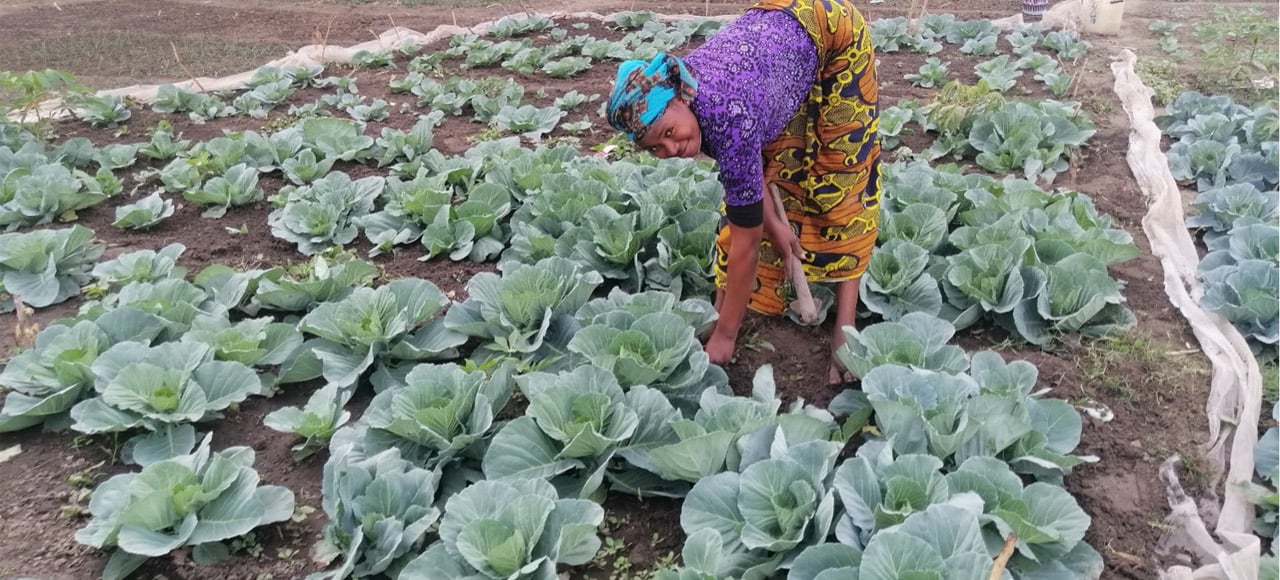
Woman ploughing her vegetable garden. The fruit and vegetable plots are part of the Bakau Women’s Garden Project, The Gambia
Food System Adaptations in Changing Environments in Africa (FACE-Africa)
Generating evidence and solutions for resilient and sustainable food systems in Africa that help to improve and safeguard access to healthy and sufficient food for all.
Working closely together with government policymakers and food system stakeholders, including farmers, retailers and consumers, the FACE-Africa project aims to jointly generate evidence to inform climate change adaptation strategies in food systems.
The FACE-Africa project is led by the London School of Hygiene & Tropical Medicine and the MRC Unit in The Gambia, with collaborators at the International Institute of Applied Systems Analysis (IIASA) in Austria, the CGIAR Research Program on Climate Change, Agriculture and Food Security (CCAFS) in West Africa based at the International Crops Research Institute for the Semi-Arid Tropics (ICRISAT) in Mali and the University of Cambridge.
Recent updates
Marking the end of the FACE-Africa project, on 25th January 2023 the FACE-Africa team will co-host a final symposium with the Ministry of Environment, Climate Change and Natural Resources (MECNARR)
Events
Newsletter
Contact us
In many African countries, climate change represents a profound challenge to the provision of sufficient healthy food for all. Droughts, unpredictable rainfall patterns and increased heat affect the crop yields and quality of crops. Under current climate change projections these problems will likely increase over the next decades. In addition, rapid population growth, changing diets and urbanisation will increase the demand for food in each country. If no action is taken, problems of food insecurity and associated poor health will be unavoidable. To address this problem, policy makers require country-specific information on effective strategies to adapt to climate change, and ensure sufficient production, import, manufacture and delivery of food for their populations.
- The FACE-Africa project generates evidence to inform climate change adaptation strategies - working closely together with The Gambia government policymakers and food system stakeholders, including farmers, retailers and consumers.
- We use existing data sources, such as routinely collected environmental, agricultural, nutrition and health data, and evidence on adaptations in agriculture to estimate the ability of national food systems to deliver healthy diets in the future.
- We organise participatory stakeholder discussions in which we will build realistic scenarios of what may happen in the food system in the next few decades and jointly come up with realistic interventions that will address country-level concerns.
- We use modelling approaches to evaluate what the likely impact of each of the proposed scenarios and strategies would be on environmental sustainability and population health in the next few decades.
In FACE-Africa, we currently include The Gambia as a case study country. We aim to deliver evidence that will be useful for Gambian policy makers, whilst at the same time developing methods that will be transferable to other African countries.
Read our final project report.
Recent updates
Marking the end of the FACE-Africa project, on 25th January 2023 the FACE-Africa team will co-host a final symposium with the Ministry of Environment, Climate Change and Natural Resources (MECNARR)
Events
Newsletter
Contact us
We are very grateful for the contribution of the late Prof Gail Goldberg and Dr Momodou Darboe who played a pivotal role in the development of the FACE-Africa project.

Rosie
Green
Professor
Dr Rosie Green is an Associate Professor in Sustainability, Nutrition and Health at the London School of Hygiene & Tropical Medicine. The focus of her work is on the links between nutrition, environment and health, particularly identifying dietary changes that would be positive for human health and the planet. She is a co-PI on the FACE-Africa and Pathfinder projects, and also works on the Sustainable and Healthy Food Systems (SHEFS) project, the AMPHoRA project exploring air pollution from agriculture in the UK and the South Asia Nitrogen Hub investigating health impacts of reducing nitrogen pollution from agriculture.

Pauline
Scheelbeek
Associate Professor
Dr Pauline Scheelbeek is an Assistant Professor in nutritional and environmental epidemiology at the London School of Hygiene & Tropical Medicine. Pauline’s research focusses on quantifying the impact of changing environments on agriculture, food availability and quality, nutrition, and health. Currently she is the health lead for the multi-country Sustainable and Health Food Systems (SHEFS) project and leads (together with Dr Rosemary Green) the Food system Adaptations in Changing Environments in Africa (FACE-Africa) project in the Gambia. In this context she models future food systems for the UK, South Africa and India under several climate change and adaptation scenarios. Pauline is an active STEM ambassador and frequently organises public engagement activities for school aged children in the UK and sub-Saharan Africa around environment, nutrition and health issues.

Sarah Dalzell
Research Associate
Sarah is a Research Associate at the Department of Land Economy and Visiting Fellow at the MRC Epidemiology Unit at the University of Cambridge. She is Co-Investigator on the FACE-Africa project contributing expertise on Gambian diets and the impact of rural-urban migration on food, nutrition and health in rural and urban settings in The Gambia. Sarah's research also includes collaborative Gambian projects within MillNETi ‘Millets and Nutritional Enhancement Traits for iron bioavailability’ an interdisciplinary GCRF funded programme. Her work aims to develop an integrated understanding of diets and food environments in order to identify strategies to promote sustainable diets for good nutrition and health.

Sulayman M’boob
Independent Consultant
Mr M’boob started his career with the Ministry of Agriculture in 1974 and was appointed as National Coordinator of CILLSS in The Gambia and Secretary to the Cabinet Committee on drought. In 1983 Mr M’boob became the Regional Plant Protection Officer for Central Africa at FAO, and subsequently in 1997 FAO Country Representative in Tanzania. For the FACE-Africa project Mr M’boob provides high-level support for several project components building on his experience and achievements spanning over 30 years of active working life, internationally in several African countries, in diverse fields of agricultural development and in under severe climate change impact.

Robert Zougmore
CGIAR Research Program on Climate Change, Agriculture and Food Security
As the CCAFS Africa Program leader since 2010, I have been defining and overseeing strategic directions for CCAFS research in the region and therefore, coordinating actions that lead to coherent implementation of the regional activities from the participating CGIAR Centres and other regional and national partners. One of my major tasks is to communicating regional research outputs and strategy through innovative means. Under my leadership, CCAFS action research was conducted at all levels in a way to generate scientific information that inform top-down and bottom-up decision-making processes on climate change, agriculture and food security.

Andrew Prentice
Head of MRC International Nutrition Group
Professor Andrew Prentice has led nutrition research in rural African setting for over 4 decades. He provides high-level support to the project and assists with identification of key stakeholders in The Gambia.

Zakari Ali
Research fellow
Zakari is a Research fellow at the MRC Unit The Gambia at the London School of Hygiene & Tropical Medicine (LSHTM) based in The Gambia – working on the FACE-Africa project. Zakari’s research focuses on mapping the Gambian food system and its adaptations to climate change using existing secondary data sources. He works closely with the Gambian food system stakeholders including government ministries and departments, NGOs, researchers, local farmers and climate interest groups to co-create evidence that is locally relevant for policy and adaptation to climate change. Zakari has MSc in Nutrition for Global Health from LSHTM and previously worked for two years as a Research Assistant in Ghana with the University for Development Studies where he worked on maternal, child and adolescent nutrition research. (ORCID: https://orcid.org/0000-0002-8129-2230)
Petr Havlik
Deputy Program Director, Ecosystem Services and Management, IIASA
Dr Petr Havlik (Deputy Program Director, Ecosystem Services and Management, IIASA) oversees the use of EPIC and GLOBIOM models developed at IIASA to fit the data specific to The Gambia.

Amanda Palazzo
Research Scholar
Amanda Palazzo (Research Scholar at the International Institute for Applied Systems Analysis (IIASA)) is one of the main developers of the partial-equilibrium model Global Biosphere Management Model (GLOBIOM). Her main topics of research concern participatory approaches to develop and model plausible regional future scenarios of food security and agricultural development, the representation of the water-energy-land nexus in economic modelling including impacts of climate change and growing sectoral demands (agriculture, domestic, energy, and environment), and assessing the impacts of investments in irrigation infrastructure. She has also worked extensively in stakeholder engagement to link qualitative and quantitative scenarios and modelling tools. (ORCID: https://orcid.org/0000-0001-8167-9403)

Alcade Segnon
Postdoctoral Scientist – Climate and Policy, CCAFS
Dr Alcade Segnon is a Postdoctoral Scientist at the CGIAR Research Program on Climate Change, Agriculture and Food Security (CCAFS), based at ICRISAT in Bamako, Mali. Alcade’s research interest is the intersection of climate change adaptation, agrobiodiversity and traditional knowledge systems; and agroecosystem sustainability. He is particularly interested in how and to what extent agrobiodiversity and knowledge that local people share on it can be used to improve smallholders' livelihoods and resilience to environmental change. Alcade’s research also includes assessing adaptation effectiveness to inform policy decision making across scales. Dr Segnon is involved in the Global Adaptation Mapping Initiative (GAMI) and is a Contributing Author of the IPCC's sixth Assessment Report, WGII. In FACE Africa project Alcade will contribute to synthesize adaptation options relevant to The Gambia food systems adaptation and to stakeholder engagement activities.

Philip Thornton
Flagship Leader and Principal Scientist, CCAFS
Dr Philip Thornton (Flagship Leader and Principal Scientist, CCAFS) provides guidance on agricultural adaptations to climate change and modelling the food system in The Gambia.

Felicity Addo
Research Scholar
Felicity Addo is a research scholar at the International Institute for Applied Systems Analysis. Her current scientific interests include examining food security pathways in developing countries and micro-econometric modelling of agricultural production systems applied to i) farm efficiency, competitiveness, and performance, ii) agricultural policies and iii) farmers’ input use, costs, and investment decisions. Currently, she contributes to multiple projects in the EU and Africa. Within the FACE-Africa project, she co-developed tools for modelling sustainable and resilient food and land-use pathways for The Gambia with a special focus on sustainable and healthy diets, climate change and adaptation, and agricultural productivity, trade, and land use dynamics.

Tony
Carr
Res Fellow in Food Systems, Health
Dr Tony Carr is a Research Fellow at the London School of Hygiene & Tropical Medicine (LSHTM). His research focuses on the links between agriculture, the environment, and healthy diets. He is involved in the FACE-Africa project, where he is contributing to modelling the impact of farming techniques and climate-smart agriculture on crop production in West Africa, and projecting future food demand and supply in The Gambia. Prior to joining LSHTM, he completed his PhD at University College London on the impacts of soil degradation and climate change on global cereal production.

Genevieve
Hadida
Research Assistant
Genevieve Hadida joined the London School of Hygiene & Tropical Medicine as a Research Assistant in 2021, having completed an MSc in Nutrition for Global Health at the school. Her research interests lie at the intersection of food systems, nutrition and sustainability. She supports the FACE-Africa team, where her work has focused on analysing The Gambia’s trade of crops, particularly the climate vulnerability of its imports.
Sidat Yaffa
Chair of Advisory Board
Senthold Asseng
Member of Advisory Board
Olivier Crespo
Member of Advisory Board
Ama Essel
Member of Advisory Board
Jacques Andre Ndione
Member of Advisory Board
Daouda Kone
Member of Advisory Board
Recent updates
Marking the end of the FACE-Africa project, on 25th January 2023 the FACE-Africa team will co-host a final symposium with the Ministry of Environment, Climate Change and Natural Resources (MECNARR)
Events
Newsletter
Contact us
Recent updates
Marking the end of the FACE-Africa project, on 25th January 2023 the FACE-Africa team will co-host a final symposium with the Ministry of Environment, Climate Change and Natural Resources (MECNARR)
Events
Newsletter
Contact us
Marking the end of the FACE-Africa project, on 25th January 2023 the FACE-Africa team will co-host a final symposium with the Ministry of Environment, Climate Change and Natural Resources (MECNARR) to reflect on results from the 3-year project and think about future steps.
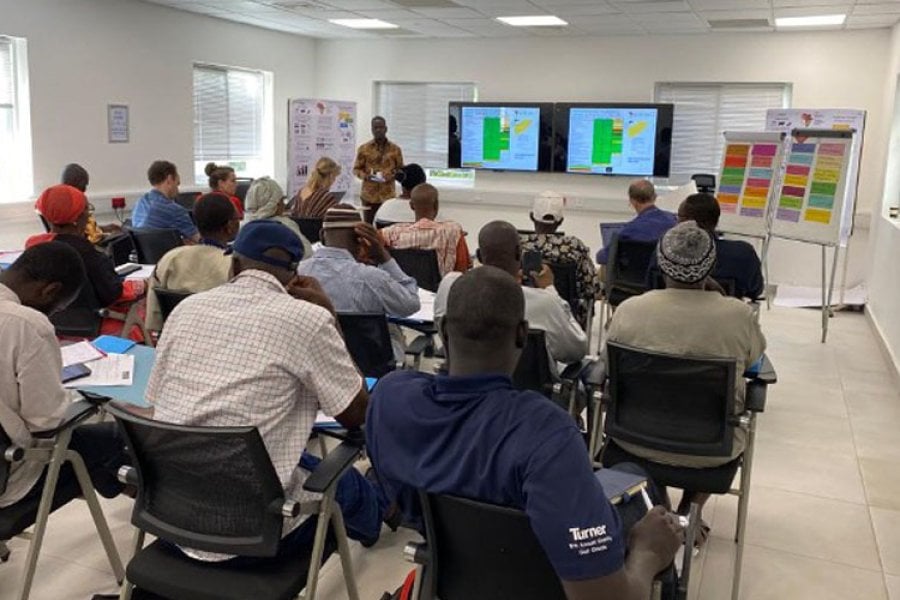
In June 2022, the FACE-Africa team hosted two workshops in The Gambia. They consulted with stakeholders from several ministries, departments, and agencies (i.e. Ministry of Agriculture, MECCNAR, Ministry of Health, FAO, GBoS, farmer groups and NGOs). In the first workshop, scenarios of what the future Gambian food system could look like were co-developed, and in the second, stakeholders discussed and prioritised adaptation options for The Gambia. The outcomes of both workshops fed into two pieces of work – the development of a Gambia-specific version of the FABLE Calculator (FABLE-Gambia), and a final ranking of key adaptation options.
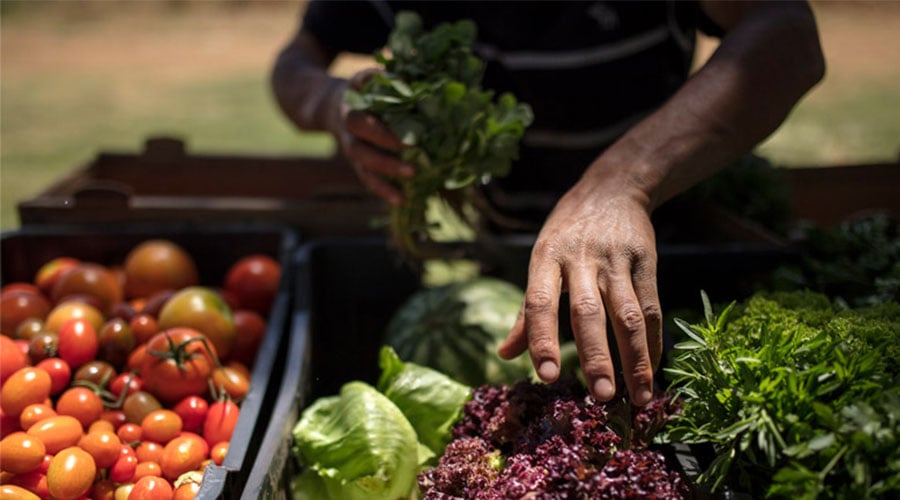
The FACE-Africa team – led by Mr Zakari Ali – published their vision on possible long-term consequences of the COVID pandemic on food systems in West-Africa in Nature Food. Read the whole paper.
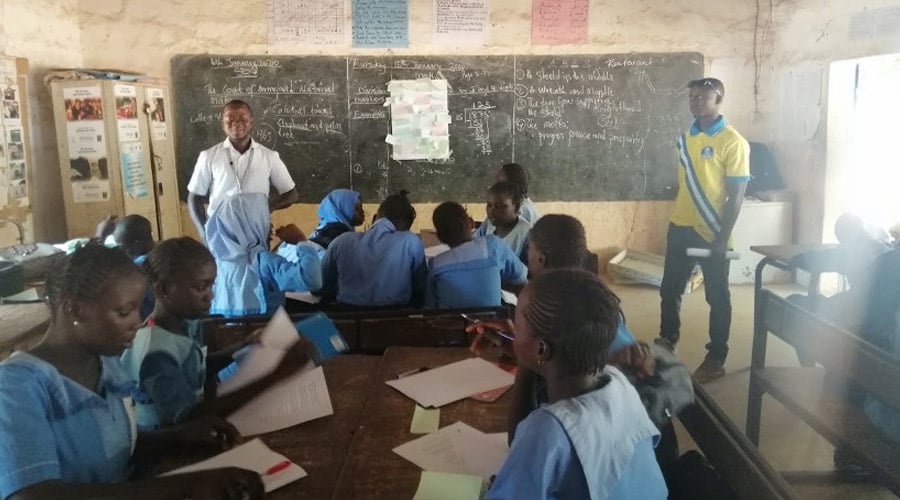
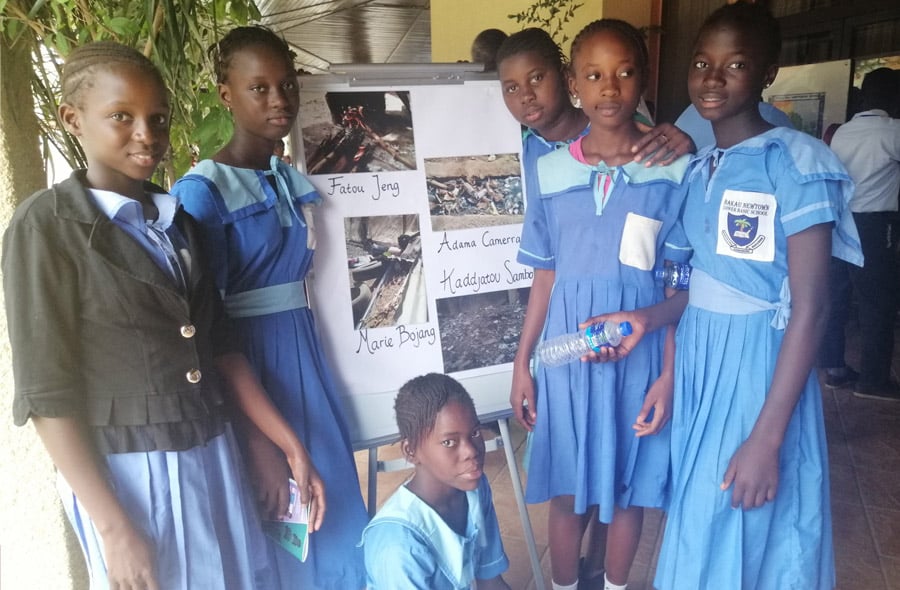
FACE-Africa will co-fund a Science Festival for Secondary School children in The Gambia. The Festival will focus on solutions for Climate Change Adaptation and Mitigation in their local environment. The Festival will take place in May 2021.
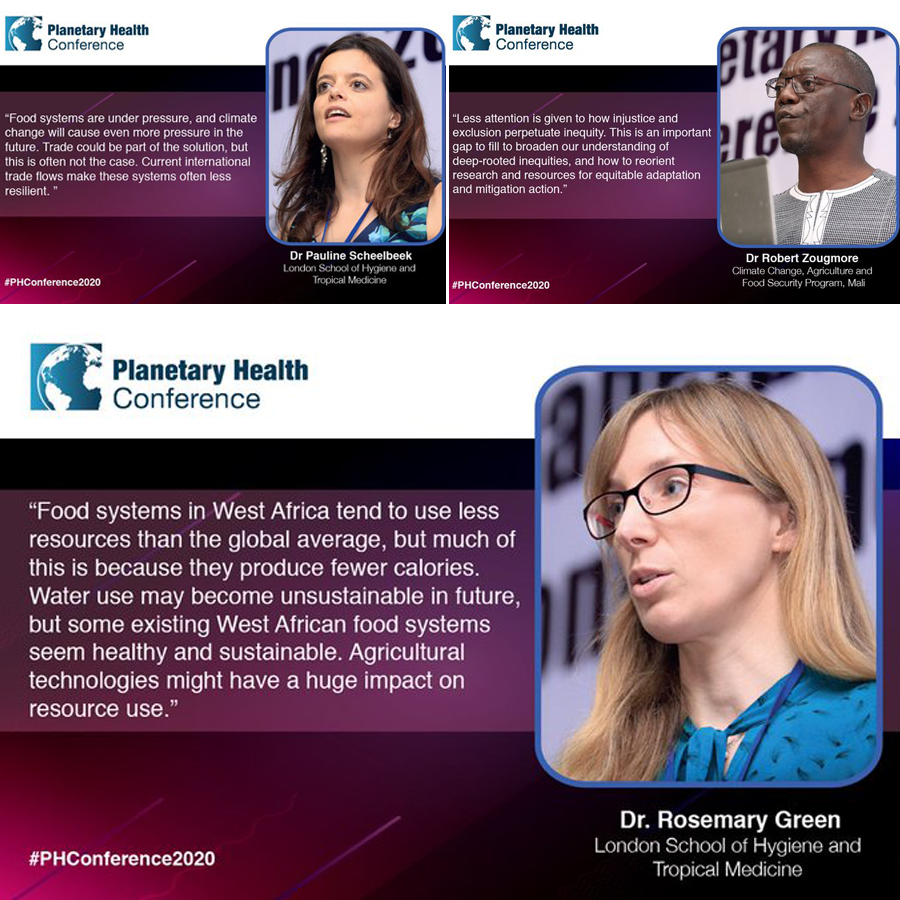
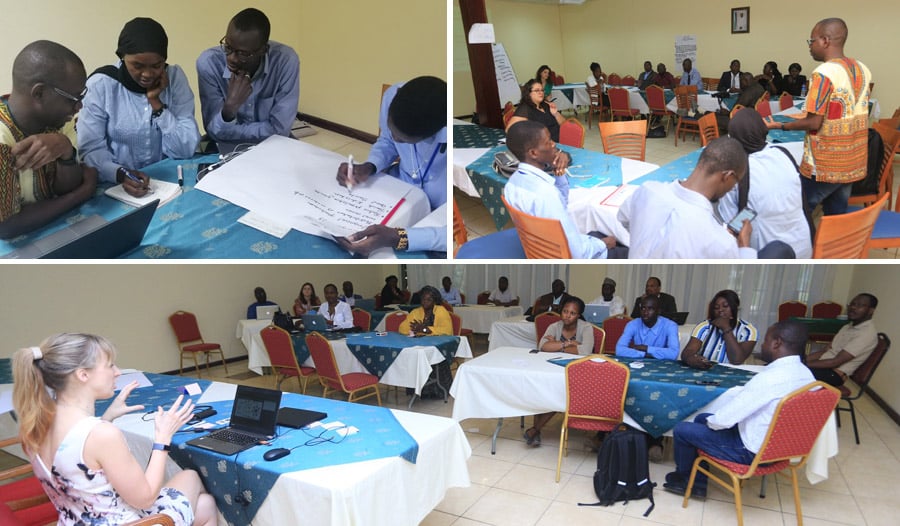
Several team members of FACE-Africa team presented at the first Planetary Health Conference in West-Africa held in the Kairaba Beach Hotel in Banjul, The Gambia. Dr Green and Mr Ali hosted a learning lab on environmental footprints of diets, while Ms Palazzo and Dr Scheelbeek hosted a learning lab on Future Scenario Analysis. Dr Green and Dr Scheelbeek also presented in the plenary session.
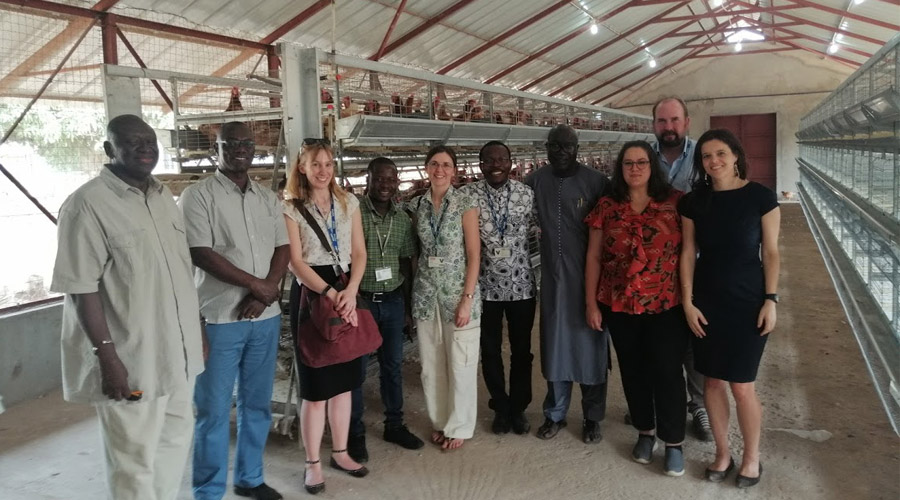
In January 2020, FACE-Africa had its kick off meeting in Fajara, The Gambia. On the first day, the core team met to plan their research strategy for the year to come, and made a field visit to several farms in and around Banjul. On the second day, a stakeholder and policy meeting took place in which the project was introduced and discussed with the attendees. Several policy-makers from various ministries within the National Government attended the meetings and expressed their support for the project.
Recent updates
Marking the end of the FACE-Africa project, on 25th January 2023 the FACE-Africa team will co-host a final symposium with the Ministry of Environment, Climate Change and Natural Resources (MECNARR)

